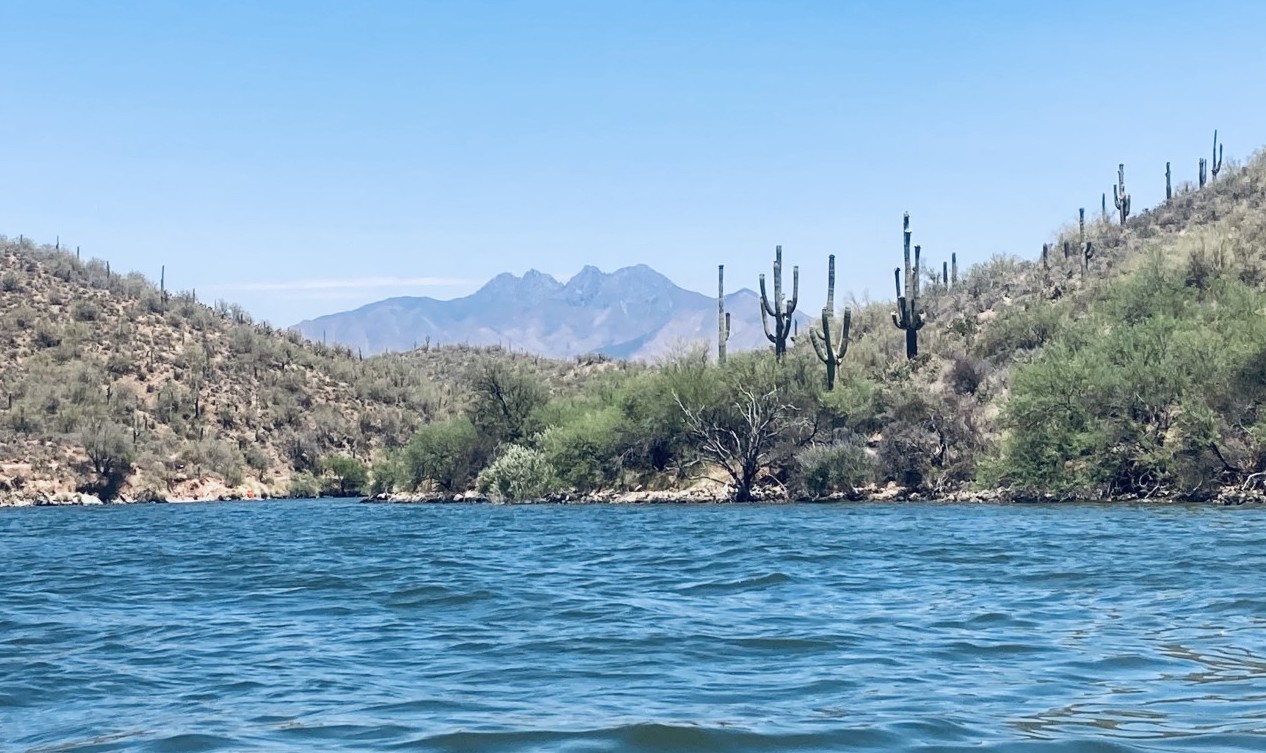BEST ARIZONA DUI / OUI ATTORNEY
In Arizona, you can be placed under arrest for boating while under the influence. The charge is separate from DUI- for boats, it is called Operating Under the Influence, or OUI, but is commonly referred to as BUI (boating under the influence.) If you’ve been arrested for operating a boat while under the influence, you may be overwhelmed by the amount of questions that you have for a criminal defense attorney. Read on if you’d like to see our most frequently asked questions from OUI clients, and call our firm to schedule your free consultation at 480-448-9800.

A.R.S. 5-395 Impaired operation of a motorized watercraft is defined by A.R.S. § 5-395. The defendant can be operating or have actual physical control over a motorized watercraft to be charged under this section. There are four definitions of impaired operation of a motorized watercraft in this section:
![]() Impaired to the slightest degree by any intoxicating liquor, drug, vapor releasing substance containing a toxic substance or any combination of these
Impaired to the slightest degree by any intoxicating liquor, drug, vapor releasing substance containing a toxic substance or any combination of these
 Blood Alcohol Concentration (BAC) of 0.08 or more within 2 hours of operating or being in actual physical control of the watercraft
Blood Alcohol Concentration (BAC) of 0.08 or more within 2 hours of operating or being in actual physical control of the watercraft
![]() Any drug defined by A.R.S. § 13-3401 or its metabolite in the person’s system
Any drug defined by A.R.S. § 13-3401 or its metabolite in the person’s system
![]() For the operator of a commercialized watercraft, a BAC of 0.04 or more
For the operator of a commercialized watercraft, a BAC of 0.04 or more
ARIZONA OUI FREQUENTLY ASKED QUESTIONS
WE OFFER IMMEDIATE DUI / OUI LEGAL REPRESENTATION
Some valid prescriptions, as well as medically-prescribed marijuana, can impair someone’s ability to operate a motorized vehicle. A valid prescription for the drug in question is only a defense to the third charge under section 5-395 because it doesn’t actually require that the operator be impaired. The defendant must be able to prove that the amount of the drug or its metabolite in their system wasn’t enough to impair their ability to operate a motorized watercraft. BAC Classifications for Arizona OUI include:
· Impaired to the slightest degree: 0.05 to 0.08 if there are other factors showing the defendant’s intoxication
· Standard OUI: 0.08 to 0.149
· Extreme OUI: 0.15 to 0.19
· Super Extreme OUI: 0.20+
· Commercial watercraft: 0.04
ARIZONA BOATING DUI LAWYER NEAR ME
Most people know that operating a motor vehicle while under the influence is illegal in Arizona. This logically extends to boats with motors, but boating under the influence isn’t charged under Arizona’s DUI law, or A.R.S. § 28-1381. Boating under the influence is legally referred to as operating under the influence in Arizona, or OUI for short. Arizona cracks down on all forms of impaired operation of a motor vehicle, and boating isn’t excluded. OUI charges should be taken seriously and defended aggressively in Arizona. To schedule your free consultation with an experienced member of our criminal defense team, call 480-448-9800.
DEFENSES AGAINST OUI CHARGES
ARIZONA’s BEST DUI / OUI CRIMINAL DEFENSE ATTORNEYS
1. Lack of Reasonable Suspicion
The 4th Amendment of the United States Constitution guarantees protection from unlawful searches and seizures by the government. A police officer can’t pull over a boater and breathalyze them based on a preconceived notion or gut instinct. There must be demonstrable reasonable suspicion that the operator was under the influence or committing some other offense to be pulled over. The only exception to this rule is in the case of a constitutional OUI checkpoint.
2. Lack of Probable Cause
The fact that a police officer had reasonable suspicion to investigate you for OUI doesn’t necessarily mean that they had sufficient probable cause to place you under arrest. Probable cause is a higher standard and if an officer arrests a defendant without probable cause, it can destroy the prosecution’s case.
3. No Actual Physical Control
Sometimes, OUI defendants are placed under arrest when they aren’t actually driving, steering, or otherwise operating a watercraft. A common example of this in a DUI situation is when the defendant is arrested while “sleeping it off” in their vehicle. In an OUI scenario, a defendant may be placed under arrest for mere presence on a boat when they weren’t actually operating it. Discuss your case with a defense attorney as soon as possible if you believe you have been arrested due to confusion about whether you were in actual physical control of the watercraft.
4. Failure to Read Miranda Rights
An OUI defendant being placed under arrest has the right to be read their Miranda rights, which include the right to remain silent, the right to a court-appointed attorney, etc. If the police don’t read a defendant their Miranda rights, they might make statements while in police custody that they otherwise would’ve had the knowledge to avoid. If the defense can prove that the police failed to read Miranda rights during the arrest, statements made to the police and other post-arrest evidence can be deemed inadmissible at trial.
5. Denial of Right to an Attorney
A defendant should be aware of their right to legal counsel due to being read their Miranda rights. Someone who is placed under arrest for OUI should invoke that right as soon as possible. When the defendant invokes their right to counsel, they should be provided with a phone to call an attorney, as well as a private place to conduct that call. A mistake like this by the police can possibly result in dismissal of the charges against the defendant.
Your Content Goes Here
6. Denial of Independent Testing
An OUI defendant in Arizona has the right to have their chemical sample tested by an independent laboratory. If these results don’t match up with the government test’s results, there could be issues in the prosecution’s case. If the defendant is denied this right after invoking it, it could rule out the original BAC results or even get the case dismissed altogether.

7. Improper Field Sobriety Testing
Field sobriety testing is informal testing used by the police before collecting an official chemical sample. The most commonly used field sobriety tests are the horizontal gaze nystagmus, walking in a straight line, and standing on one foot. There are several reasons that field sobriety testing could be improper, especially in an OUI setting. If the waters are rough, even the soberest person could seem impaired during typical field sobriety tests. Someone could also have an injury or disability that causes them to erroneously fail field sobriety tests.
8. Inaccurate Breathalyzer Results
There are stringent protocol in place to make sure that breathalyzer tests are conducted correctly. The device must be calibrated properly, and the officer must make sure to observe a 15-minute waiting period before testing the defendant’s BAC. This waiting period is to ensure that the boater doesn’t burp, puke, eat, drink, or do anything else that could skew the test results. The defendant could have a medical condition that causes a false positive, and technological issues could cause a false positive as well. The defendant and their attorney should investigate the breathalyzer results, as well as their chain of custody, as part of the defense strategy.
9. Inaccurate Retrograde Extrapolation
Often, the police may not test the defendant’s blood or urine until significant time has passed since their last drink. Here, the police might use retrograde extrapolation to estimate what the defendant’s BAC would have been at the time of the arrest. If so, the defendant should challenge these calculations in any way possible.
ARIZONA OUI PENALTIES
TOP-RATED DUI AND OUI LEGAL REPRESENTATION

Base Level OUI Penalties.
First Offense
· Minimum 10 days jail sentence
· Up to 60 days can be commuted
· Fines of approximately $1,250
· Community service
· Drug and alcohol screening, education, and treatment

Base Level OUI Penalties.
Second Offense
· Minimum 90 days jail sentence
· Up to 60 days can be commuted
· Fines of approximately $1,250
· Fines of approximately $2,500
· Community service
· Drug and alcohol screening, education, and treatment

Base Level OUI Penalties.
Third Offense
· If committed within 84 months of first OUI, this is a felony
· Minimum 4 months prison sentence
· Fines of approximately $4,000
· Community service
· Drug and alcohol screening, education, and treatment
· Forfeiture of the watercraft involved in the arrest


Extreme OUI Penalties
· Minimum 30 days jail sentence
· Up to 21 days can be commuted
· Fines of approximately $2,500
· Community service
· Drug and alcohol screening, education, and treatment


Extreme OUI Penalties
Second Offense
· Minimum 120 days jail sentence
· Up to 60 days can be commuted
· Fines of at least $2,500
· Community service
· Drug and alcohol screening, education, and treatment


Extreme OUI Penalties
Third Offense
· Minimum 4 months prison sentence
· Fines of at least $4,000
· Community service
· Drug and alcohol screening, education, and treatment
· Forfeiture of the watercraft involved in the arrest



Super Extreme OUI Penalties
First Offense
· Minimum 45 days jail sentence
· Fines of at least $2,750
· Community service
· Drug and alcohol screening, education, and treatment



Super Extreme OUI Penalties
Second Offense
· Minimum 180 days jail sentence
· Up to 90 days can be commuted
· Fines of at least $3,750
· Community service
· Drug and alcohol screening, education, and treatment



Super Extreme OUI Penalties
Third Offense
· Minimum 4 months prison sentence
· Fines of at least $4,000
· Community service
· Drug and alcohol screening, education, and treatment
· Forfeiture of the watercraft involved in the arrest




Aggravated OUI
Aggravated OUI is a felony, making it much more serious than a standard misdemeanor OUI charge in Arizona. Convicted felons will have to fight to regain the right to vote, run for public office, and possess a firearm. The standard penalties for OUI (listed above) are as follows:
· Minimum 4 months prison sentence
· Fines of at least $4,000
· Community service
· Drug and alcohol screening, education, and treatment
· Forfeiture of the watercraft involved in the arrest
Note that a defendant convicted of felony OUI will lose their watercraft, while a defendant convicted of a misdemeanor OUI will not suffer that consequence. There are two ways to be charged with felony OUI in Arizona. The first is by receiving 3 OUI charges in an 84-month period. Here, the defendant will be penalized as listed above. The second way to be charged with felony OUI is by having a passenger under 15 years old onboard at the time of the arrest. While this conviction will still show up on your record as a felony, you will be penalized with the underlying offense as if you didn’t have a child passenger.
Arizona OUI and DUI Lawyers
Common Police Tactics for OUI Enforcement
Arizona’s notorious pursuit of drunk drivers doesn’t just apply to our roadways, but our waterways as well. There is also a strong incentive for the police to keep our lakes, rivers, and other waterways safe and enjoyable for everyone, not just those who do so while under the influence. Police can pull over boaters who are operating their watercraft in an unsafe manner or otherwise failing to comply with state boating laws. Licensing and registration issues can lead to a stop that can result in arrest, as can littering. The police may also investigate a boater for OUI if they can clearly see alcohol on the watercraft. Another common tactic Arizona police use to apprehend drunk boaters is creating boating checkpoints. Boating checkpoints work similarly to DUI checkpoints on the road. They have been repeatedly upheld as constitutional in court as long as the police stop and investigate boaters in a routine manner rather than based on race, age, sex, etc.
Arizona Zero Down DUI lawyers assist clients in experienced criminal defense against OUI and DUI charges in Arizona. Contact the best DUI attorneys in Arizona to schedule a free consultation. Discuss your arrest and charges with an attorney dedicated to the best possible results for your specific case.

